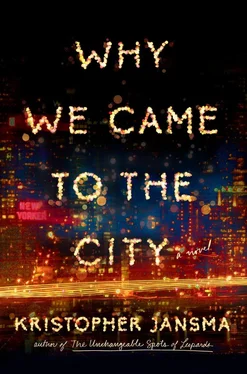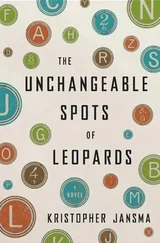“That’s so fifties , yo!” Allen had screamed. “Shit, you’re like my fucking grandparents .”
Like George’s fucking grandparents, too, he supposed, or even like his sleeping-in-separate-bedrooms-for-the-last-twenty-years parents.
Allen didn’t seem likely to drop it. “What if there’s something weird down there, and you don’t even know it because you’ve never seen any other ones?”
George made a face. “I took AP Biology, Allen. I have an Internet connection.” Then he gestured up to the stage at the current dancer, who was bottomless, just as advertised. “I know what a — I know what one’s supposed to look like.”
After briefly clutching his head in his hands, Allen threw an arm around George. “That’s craziness. I mean, I just couldn’t. It’s — evolutionarily counterproductive!”
“Oh, you’re a biologist now?”
“Look. The male of the species is naturally drawn to polyamorous behavior, and the female is structurally inclined toward birthing and child care…”
George didn’t hear much after that, partly because of the bass coming off the stage and partly because he had heard this all before from Allen, who was fond of sharing stories of his conquests, late at night when they were up editing grants, or poring over thousands of data points in the lab, sometimes even in the middle of the day just walking down the halls at the institute. Allen was an aficionado of all the new online dating sites: Match.com, OKCupid, Chemistry.com, ScienceConnect. He even had an app for his phone that let him scroll through the profiles of nearby available women and indicate with a swipe of his finger if he was interested in them, as if he were seated at some sort of sex buffet. Sara said she couldn’t figure what on earth these women saw in him, but according to his locker-room talk, Allen was getting laid left, right, and center.
George suddenly felt a profound desire to know: “Is it really so great sleeping with all these different people?”
Allen paused as if, for an instant, he couldn’t comprehend the question. Then, incredulous, he responded. “Man, it’s awesome . I — George… you’re making me sad. I’m sorry. This is your night, and I’m happy for you and Sara and all but — what a question!”
George stopped listening. Jumping into bed with some woman he’d only just met seemed pleasant in theory but awful in practice. Not just being naked in front of a stranger, not just having his anatomy and performance evaluated by someone whose standards were unknown, not even the awkwardness of what to do with all that you’d used up in one another afterward, but mainly just the idea of being that close to someone he didn’t know crucial things about: Middle name. Best friend’s name in middle school. County of birth. Number of siblings. Feelings about Elvis. Preference for or against nuts in brownies. Ability to ride a bicycle. Major allergies. Burial locations of childhood pets. Most embarrassing moment of adulthood. Approximate number of pairs of shoes owned. Use of contact lenses. Song to be played at their funeral.
George supposed he had always been a monogamist. Even back in kindergarten he had gotten in trouble. A meeting had been called with his mother and Mrs. Remington. Young George had been systematically working his way through the girls in the class, asking them each to marry him under the swing set, with a ring made out of a twisted juice-box straw. And as an adult, now, when he did spot a beautiful stranger, riding home on the T at night, he never fantasized about jumping into the empty conductor’s cab for eleven anonymous minutes in heaven. No, he’d imagine beginning some awkward conversation: she’d drop something, or he’d trip over someone else’s umbrella, and they’d chat amiably for a few stops about something in the news. They’d discover some shared love of something — the fresh berry crème brûlée at Finale, or how the Gardner Museum still left blank spaces on the walls where a half dozen paintings had been stolen in the 1990s, or the six-story fish tank at the New England Aquarium. And then the fantasy would fast-forward. Some weeks or months would go by and, by chance, George would find himself alone one rainy afternoon, walking by Finale, or the Gardner, or the Aquarium. And there she’d be. They’d see each other by accident. Remember. Laugh. Act like old friends. Go to grab a cup of coffee. But this wasn’t the weirdest part of the fantasy. Not in the least.
The weirdest part was that always, he’d imagine that somewhere in those intervening weeks or months, something would have happened to Sara. She’d have left him or been in a terrible accident. It was usually nothing specific, just that she was gone, and he was sad. The whole thing was awful — but it was the only way he could clear his conscience so the fantasy could continue. Even in his wildest dreams, he couldn’t fathom cheating.
George tried to forget all this as he climbed into the hot shower. Fifteen minutes left to go. Shampoo. Conditioner. He couldn’t find his toothbrush, so he used a fingertip to scrub his teeth. He knew Sara would tell him to just throw up. He considered jabbing his finger back a little farther and seeing what happened, but the thought of it was somehow even worse than the thought of his belly remaining full of last night’s post-rehearsal tequila shots. If she’d been there, he would have done it. To show her that, despite his poor decision making the night before, he was now, that morning, 100 percent committed to getting things back on track.
But without her there, he couldn’t manage it. There was so much he couldn’t manage without her. He bent down right there under the stream of water and prayed that he would never have to. Sick unto death, he thanked God that he was going to marry Sara in just a couple of hours. Through the fog in the bathroom, he could see the clock on the wall. Ten minutes left. He closed his eyes, let the hot water run over him, and tried to picture her body — they had been so busy in the lead-up to the wedding that it had been a few weeks since they’d slept together. She’d been working so hard to fit into her dress that he’d begun to almost not recognize her.
Truth be told, in the past two years things had slowed down considerably in that department. Which was his fault, not hers. Just as he couldn’t bring himself to relax and enjoy a cold drink or a long walk or a night out, he had been struggling to keep his head in the room when he was alone with Sara as well. Clothes off or on, really. When they were having dinner or watching TV, he was aware of always being halfway somewhere else. It used to be the other way around — whenever he was away from her, she was all he thought about. Of course he knew that these things changed over time. People went from being lovers to companions over the course of a relationship. He just didn’t think that would start to happen before he turned thirty, before they’d even said, “I do.”
But after what they’d been through — essentially managing a hospice out of William’s living room — he felt as if his twenties were already far behind him. What still felt right on top of him was the loss. Irene’s absence. At night, while ¡Vámonos, Muchachos! was on commercial breaks, he would sometimes stumble over to her urn on the mantelpiece and clink his drink against the curved metal handles as if to say hello. Occasionally he’d lift it off the fireplace and carry it over to the couch so it could watch with him. Sara had not been happy, the first morning she’d found him there like that.
Soon after this incident, they’d agreed it was time to scatter the ashes. Jacob had told Sara how Irene had asked to be scattered in France, and she’d agreed they ought to do it on the honeymoon. There was a spot in the mountains nearby where the cliffs rose two thousand feet above the most beautiful turquoise water. Sara knew that one of Irene’s greatest regrets was never having left the country, and here was their chance to rectify that. George didn’t know if it was really the right move, but he wanted to make Sara happy, and he wanted to get things back on track. There would be the wedding night, in the bridal suite, and there would be ten more beautiful days in a French seaside paradise, where absolutely nothing could go wrong.
Читать дальше












